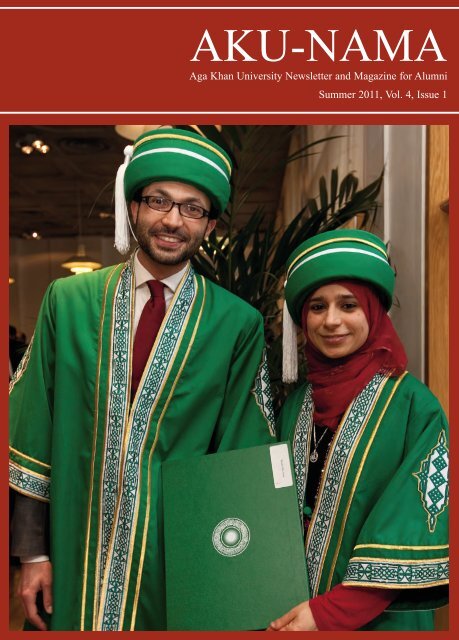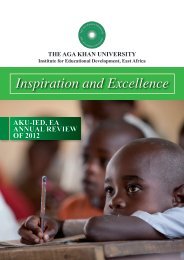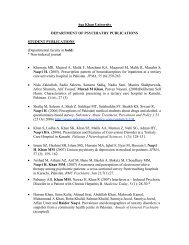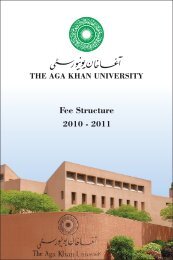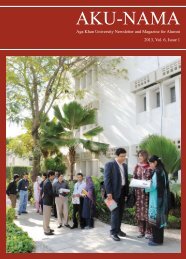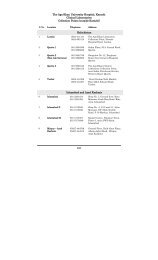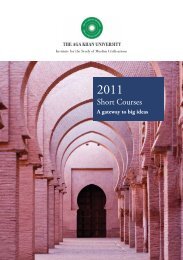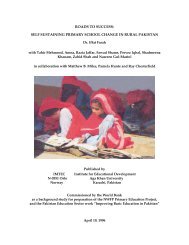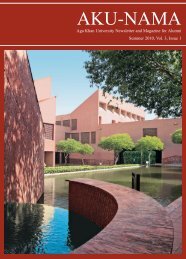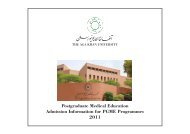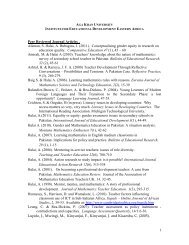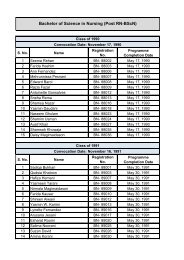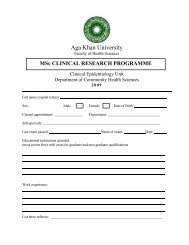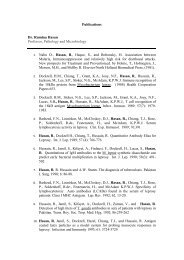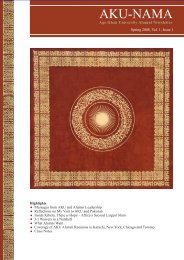Summer 2011, Vol. 4, Issue 1 - Aga Khan University
Summer 2011, Vol. 4, Issue 1 - Aga Khan University
Summer 2011, Vol. 4, Issue 1 - Aga Khan University
You also want an ePaper? Increase the reach of your titles
YUMPU automatically turns print PDFs into web optimized ePapers that Google loves.
AKU-NAMA<br />
<strong>Aga</strong> <strong>Khan</strong> <strong>University</strong> Newsletter and Magazine for Alumni<br />
<strong>Summer</strong> <strong>2011</strong>, <strong>Vol</strong>. 4, <strong>Issue</strong> 1
C o n t e n t s<br />
Editor-in-Chief<br />
Adeel A. Butt<br />
aabutt@gmail.com<br />
Editorial Staff<br />
Shain Amershi, Executive Assistant<br />
alumni.nachapter@aku.edu<br />
Associate Editors<br />
Faiz Bhora<br />
Medical College, North American Chapter<br />
fybhora@aol.com<br />
Nursing alumni at the Alumni Reunion, December 2010.<br />
Audio/Visual Department, AKU<br />
IN THIS ISSUE<br />
From the Editor’s Desk 3<br />
(Re)Creating Culture through Art 4<br />
In the Age of Transformative Technology 6<br />
A Unique Experience 7<br />
Rahila Zakir<br />
Medical College, European Chapter<br />
rahila.zakir@gmail.com<br />
Tazeen Jafar<br />
Medical College, Pakistan Chapter<br />
tazeen.jafar@aku.edu<br />
Erum Kabani<br />
School of Nursing<br />
erum.kabani@aku.edu<br />
Fahmida Mehdi<br />
School of Nursing<br />
fahmida.mehdi@aku.edu<br />
Nadim Farooqui<br />
Institute for Educational Development<br />
nadim.farooqui@aku.edu<br />
Cover photo: ISMC graduates, Mustafa Abulhimal and Meriam Ben Amor, at Convocation <strong>2011</strong> / Nadia Bettega<br />
Symphony 7<br />
Taking the AKU Torch Forward 8<br />
Thank You, AKU 10<br />
Care for the Dying 11<br />
A Lifetime of Learning 11<br />
Mini-Reunion in Kansas City 12<br />
World Health Day – in Kenya 13<br />
Reaching Out to the Community 14<br />
Teaching the Teachers – Interview with Jane F. A. Rarieya 16<br />
Campus Happenings 18<br />
Class Notes 19<br />
A Friend Remembered – Dr Basith Ghazali 19<br />
NRMP Match Results 22<br />
Nilufar Shariff<br />
Advanced Nursing Studies, East Africa<br />
nilufar.shariff@aku.edu<br />
Balkis Rouached<br />
Institute for the Study of Muslim Civilisations<br />
balkis19hope@yahoo.ca<br />
Marie Andrades<br />
Postgraduate Medical Education<br />
marie.andrades@aku.edu<br />
Advisory Members<br />
Firoz Rasul<br />
President<br />
Louis R. Ariano<br />
<strong>University</strong> Registrar<br />
Abdul Haq Wahedna<br />
Manager<br />
Alumni Affairs<br />
Dhunmai Cowasjee<br />
Director<br />
Public Affairs<br />
Shariq Haroon<br />
Senior Assistant Manager<br />
Public Affairs<br />
Khuzaima Fatima Azam<br />
Assistant Manager<br />
Public Affairs<br />
The views and opinions expressed in this publication are of the individual authors alone and do not necessarily reflect the views or policy of the editorial board<br />
or <strong>Aga</strong> <strong>Khan</strong> <strong>University</strong>.<br />
2
f r o m t h e e d i t o r ’ s d e s k<br />
the Bucket List<br />
Adeel A. Butt<br />
The Class of 1988 at their orientation ceremony; Dr Basith Ghazali is third row from the front, fourth from left.<br />
I have a bucket list. As the years<br />
pass by, I have been able to check<br />
off many items on this list. Some<br />
happened fortuitously and without<br />
much effort on my part. Others<br />
required some effort. Yet others<br />
needed a fair amount of struggle.<br />
And then there are those that<br />
require little effort or struggle –<br />
and yet remain on the list undone.<br />
Till a few months ago, I had a<br />
sense of certainty. After all, I had<br />
been able to check off some daunting<br />
items on my bucket list. And<br />
things were well on track to complete<br />
those that remained. Then I<br />
was woken up by two phone calls,<br />
in a span of one hour, delivering<br />
news of the deaths of two people I<br />
knew well. Both about the same<br />
age as myself, both doing very well<br />
the last time I met them, both with<br />
enormous potential, much of which<br />
will remain unutilised. One of them<br />
was a fellow alumnus from Class<br />
of 1988, the first class to graduate<br />
from <strong>Aga</strong> <strong>Khan</strong> <strong>University</strong> Medical<br />
College. I will never know what<br />
was on their bucket lists, or<br />
whether they even had one. What is<br />
certain is that whatever remained,<br />
would remain unchecked.<br />
Which brings me to the point I<br />
am trying to make: checking off<br />
items on our bucket lists while we<br />
still have the ability to do so. This<br />
is especially true for items that<br />
require little effort, and those that<br />
would leave our legacy behind.<br />
Whether it is a gift to our alma<br />
mater, the people we mentor, the<br />
children we help educate, or the<br />
political or social change we help<br />
bring about, that is what will<br />
remain. All that is left of us is the<br />
people who have benefited from<br />
our lives, the societal good that we<br />
have helped achieve. That is the<br />
ultimate capital, the ultimate<br />
investment in humanity, which will<br />
remain. Someone once said that the<br />
worth of a man’s life can be best<br />
measured by the number of people<br />
who shed tears at his death. I certainly<br />
hope that we all are able to<br />
check off a few more items from<br />
our bucket lists, and that our lives<br />
have made some difference.<br />
In memory of Dr Basith Ghazali<br />
3
f e A t U r e<br />
(re)Creating Culture through Art<br />
Zahra kazani, mA in muslim Cultures ’08<br />
The Ardabil Carpet (detail), Iran 1539-40.<br />
© Victoria and Albert Museum, London<br />
As one walks into an exhibition<br />
space, the artefacts and colours, the<br />
designs and patterns all aim to mesmerise<br />
our senses, to create an emotive<br />
response while serving as a<br />
reminder of the rich and creative<br />
history of societies – delighting the<br />
eye while satisfying the curiosity of<br />
the viewer of the evolution and environment<br />
of cultures worldwide.<br />
Exhibitions of Islamic art seek<br />
to do just that: to inspire, to lift their<br />
audiences to worlds afar through<br />
objects from different regions and<br />
centuries, providing a visual illustration<br />
of the diversity and pluralism<br />
that exists in the Muslim world<br />
and beyond. While the objects have<br />
the power and ability to highlight<br />
exquisite artistry, they also open the<br />
doors to many different facets of<br />
societies, recreating cultures, both<br />
past and contemporary. Pieces used<br />
at court or as religious art reveal the<br />
meaning or symbolic value of an<br />
object in society or even social and<br />
political contexts.<br />
A brief look at two galleries of<br />
Islamic art will help in understanding<br />
how art objects and exhibitions work<br />
to create meaning for their visitors.<br />
The Jameel Gallery in the Victoria<br />
and Albert Museum, in London –<br />
housing art from the 8th and 9th centuries<br />
all the way to the years before<br />
World War I, and from Spain in the<br />
west to Uzbekistan and Afghanistan<br />
in the east, taking in Turkey and Iran<br />
– brings to the fore the significance<br />
of design in all the exquisite pieces<br />
displayed. The Gallery seeks to<br />
introduce its audience to Islamic art<br />
by emphasising the features that are<br />
commonly present in all the objects:<br />
geometry (and the regular division of<br />
the circle), calligraphy and plantbased<br />
ornamentation, as well as<br />
human and animal representation in<br />
objects that are not religious in<br />
nature. Visitors are meant to focus on<br />
the design, pattern and illumination<br />
that the art pieces project.<br />
The idea of social relevance here<br />
is significant as the Victoria and<br />
Albert Museum (previously the<br />
South Kensington Museum) was<br />
established to collect and represent<br />
the best in art and design. The<br />
objects in the Gallery demonstrate<br />
the breathtaking range of Islamic art,<br />
showcasing culture from the Middle<br />
East and its design aesthetics – and<br />
visually complementing the other<br />
galleries in the Museum.<br />
Many of the objects are a<br />
reminder of the political affiliations<br />
that shaped the Middle East. A casket<br />
from 13th century Sicily that<br />
uses 11th century woodwork with<br />
inlaid ivory from Fatimid Egypt as<br />
its base provides a perspective of<br />
trade and cultural interaction<br />
between societies in the 13th<br />
century. Further insight into how the<br />
casket was used in society or the<br />
means that led to its production<br />
would allow for a much deeper<br />
understanding of the trade and interactions<br />
that shaped the region. Thus,<br />
4
f e A t U r e<br />
Indian and Persian carpets, 16th / 17th centuries.<br />
© Muserum of Islamic Art / State Museum of Berlin<br />
the Jameel Gallery’s displays<br />
attempt to recreate Muslim culture<br />
through an artistic and political<br />
framework.<br />
Moving to a newer exhibition<br />
space, in the Gulf, the Sharjah<br />
Museum of Islamic Civilization<br />
attempts to look at Islam and<br />
Muslim cultures through many lenses<br />
including its influence on religious<br />
culture, politics, science and<br />
art.<br />
The four galleries of Islamic art<br />
provide a chronology of objects produced<br />
in the Muslim world with its<br />
roots in 7th century Arabia. The final<br />
gallery, however, showcases contemporary<br />
art and architecture in the<br />
Middle East, extending the traditional<br />
concept of Islamic art – which<br />
typically ends in the 19th century –<br />
to modern times. As such, a set of<br />
cups with a matching glass urn<br />
embellished with colourful enamelled<br />
motifs, produced in 20th century<br />
Europe for the ‘Islamic market’<br />
and the skyline of Sharjah are both<br />
seen as components of Islamic art. In<br />
this way, the Museum has allowed<br />
the art objects to portray the city and<br />
the Emirate of Sharjah as a continuation<br />
of the rich artistic tradition and<br />
legacy of the past. By blending the<br />
‘Islamic’ past with the present, the<br />
Museum appropriates the objects as<br />
‘Arab’ and ‘Islamic’ though a majority<br />
of objects in the collection are<br />
Persian and Indian. Also, by architecturally<br />
integrating the Museum<br />
into the surrounding landscape, the<br />
suq or marketplace where the building<br />
is housed, the art objects and the<br />
Museum collectively recreate a culture,<br />
which boldly portrays the<br />
‘Islamic’ identity of the Emirate and<br />
the country as a whole.<br />
Thus, museums and art exhibitions<br />
use objects to weave a number<br />
of narratives from artistic to political<br />
to cultural. The way art objects are<br />
organised, curated, labelled and represented<br />
can convey a variety of<br />
meanings and be used to achieve<br />
numerous goals. In essence, museums<br />
have a responsibility as possessors<br />
and keepers of art objects to not<br />
collect and preserve artefacts, which<br />
are significant goals in themselves,<br />
but also to responsibly portray and<br />
represent items.<br />
It is believed that art objects<br />
have the power and potential to provide<br />
educated intellectual insights<br />
into cultural histories and narratives<br />
– in addition to provoking curiosity<br />
and eliciting a response. With<br />
Islamic art in particular, where<br />
everyday objects are used as a medium<br />
of communication, art becomes<br />
a tool through which not only design<br />
and aesthetics are traced through<br />
history, but also a means of cultural<br />
communication, societal evolution<br />
and a reflection of the multiple histories<br />
of a region.<br />
5
f e A t U r e<br />
in the Age of transformative<br />
technology<br />
suraiya simi rahman, mBBs ’97<br />
In the past few years, we are in the<br />
thick of a world being transformed<br />
by technology. However, there are<br />
those of us who are still trying to<br />
resist its onslaught and the impersonal<br />
wall that can be erected in the<br />
name of efficiency and expediency.<br />
Oliver Sacks, the neurologist, compared<br />
the inner world of his patient<br />
Mr P “the man who mistook his wife<br />
for a hat” – in his book of the same<br />
name – to that of a computer, sensing<br />
only key features without grasping<br />
what is real and concrete about<br />
objects or people. By extension,<br />
does our love for technology place<br />
us at risk of losing touch with reality?<br />
By relying so heavily on technology<br />
is there a chance that we<br />
may miss out on the real meaning of<br />
life altogether?<br />
Those of us who practice medicine<br />
have a special relationship with<br />
the schematics of disease. We form<br />
connections, see patterns and recognise<br />
microbes, manifestations and<br />
malignancies, all in a dance between<br />
nature and our minds. All of the faculties<br />
of a healer are wrapped up in<br />
creating a reality, a picture, an<br />
atmospheric consisting of the body<br />
and soul, disease and health, life and<br />
death. Unlike computers, we can<br />
sense meaning and thereby bring<br />
significance to an interaction, a relationship.<br />
A patient tells us a story,<br />
and sometimes the story is about the<br />
patient and their life, sometimes it<br />
can be about us as healers, and<br />
sometimes we can reach towards a<br />
greater significance, a hidden truth.<br />
And that is what makes us human.<br />
Technology helps us make connections<br />
in different ways. Many of<br />
us who have a Facebook account<br />
have connected with people we<br />
might otherwise have forgotten:<br />
high school friends, long-lost relatives,<br />
and maybe even coworkers<br />
from the past that we’ll eventually<br />
de-friend. Through YouTube and<br />
Twitter, we come in contact with an<br />
even greater variety of stories.<br />
<strong>Aga</strong>in, the computer may help us<br />
make connections between pieces of<br />
information to create a virtual universe<br />
of stories, but it cannot give<br />
value to these chronicles.<br />
As physicians we hear stories<br />
everyday, stories of loss and pain,<br />
hope and transcendence. But without<br />
the significance our listening or<br />
understanding can give these stories,<br />
they can form a web of information<br />
that is meaningless.<br />
Computers, smart phones and<br />
tablets with all their opportunities<br />
and frustrations are here to stay –<br />
Tariq Gilani<br />
you risk being called old-fashioned if<br />
you resist getting on the information<br />
highway. However, adopting new<br />
ways of integrating information into<br />
our environment does not mean giving<br />
up our effort to make that essential<br />
human connection.<br />
We are part of a generation that<br />
is taking a technological leap in<br />
earnest: from the earliest Atari gaming<br />
system and Apple IIe computers<br />
to the present day iPod, Kindle and<br />
MacBook, we are living our lives in<br />
an age of transformative technology.<br />
As professionals we have gone from<br />
paper charts to electronic charts and<br />
order entry systems, from actual X-<br />
rays to digital X-rays, and are dealing<br />
with all the ramifications of<br />
these changes.<br />
However, like time travellers we<br />
cannot run full tilt into the future<br />
without looking back at the past and<br />
packing the essentials. As physicians<br />
what that means is, we must meld<br />
the old with the new. We must<br />
remind ourselves, and the future<br />
generation of physicians, of the<br />
meaning that the practice of medicine,<br />
the healing of people, brings to<br />
our lives. Let us step off the superhighway<br />
a few times a day and<br />
behold the natural scenery and our<br />
place in it.<br />
6
f e A t U r e<br />
A Unique experience<br />
Written by debutante novelist<br />
Haider Warraich, MBBS ’09, Auras<br />
of the Jinn: A Pakistani Story is a<br />
tale about growing up in modern day<br />
Pakistan, peopled with characters<br />
who are almost caricatures of the<br />
personality types that dot society’s<br />
landscape. The novel is centred on a<br />
teenager, Imran, from a rundown<br />
neighbourhood in Rawalpindi. His<br />
father runs a motorcycle repair shop,<br />
and is interested only in Indian<br />
movies and his coterie of friends. His<br />
mother is a typical housewife with a<br />
life centred around the kitchen while<br />
his two sisters, Resham and<br />
Zaitoona, work as maids.<br />
Farhan, a streetwise young man,<br />
befriends and introduces Imran to a<br />
new life of street crime and drugs –<br />
with drastic consequences. Picked up<br />
by the police, Imran receives a beating<br />
severe enough to induce seizures.<br />
His father’s attempts to have his<br />
son cured of the ‘jinn’, through the<br />
ministrations of a local cleric fail<br />
and Imran finds himself confined to<br />
a hospital’s Special Ward.<br />
Enter a kadeliscope of people:<br />
the stern Nurse Kulsoom, the junior<br />
physician Nida, the facile Dr Abid<br />
and the privileged yet troubled<br />
Zerrish, all who seem far removed<br />
from the world he knows. Here<br />
Warraich draws on his medical<br />
experience to paint a fairly realistic<br />
picture of a health institution and<br />
the tribulations of its patients.<br />
If Imran survives the Special<br />
Ward it is thanks to one person as<br />
the rest are part of the ‘great game’<br />
played in Pakistan today.<br />
Khuzaima Fatima Azam is<br />
Assistant Manager, Public Affairs,<br />
at AKU in Karachi.<br />
symphony<br />
Spread over five countries on<br />
three different continents, all nine of<br />
<strong>Aga</strong> <strong>Khan</strong> <strong>University</strong>’s libraries are<br />
now working under a new integrated<br />
library management system. The<br />
newly implemented system called<br />
Symphony is one used by hundreds<br />
of academic libraries worldwide to<br />
connect people with information.<br />
Thanks to the new system, all<br />
AKU library users now have much<br />
improved access to resources as well<br />
as to functions related to their own<br />
account. From anywhere on the<br />
<strong>University</strong> network or the web, they<br />
can search the catalogues of one or<br />
all AKU libraries. Search results not<br />
only yield internal AKU resources<br />
but also provide access to Google’s<br />
freely available ones. Users can<br />
check the status of their personal<br />
account and renew and reserve<br />
books online. They also regularly<br />
receive notices warning them of<br />
upcoming due dates and over dues.<br />
They can even set-up their own<br />
search profile and be regularly<br />
Ahmed Zuberi<br />
informed of upcoming resources in<br />
their subject area.<br />
For librarians, the system provides<br />
a better and more transparent<br />
control of major library functions.<br />
Cataloguing is greatly improved by<br />
access to international standard bibliographic<br />
data, available from the<br />
Library of Congress, the National<br />
Library of Medicine and other international<br />
institutions. The new system<br />
also permits cataloguing in<br />
Arabic, Urdu and other non-Roman<br />
scripts.<br />
The implementation of this new<br />
system is a major step in achieving<br />
the overall goal of creating a global<br />
network of information resources<br />
and systems supporting all of AKU’s<br />
teaching, learning and research<br />
endeavours.<br />
Normand Demers is the <strong>University</strong><br />
Librarian.<br />
7
C o n V o C A t i o n<br />
8
C o n V o C A t i o n<br />
Taking the AKU Torch Forward<br />
Above: Graduates at ISMC’s <strong>2011</strong> convocation in<br />
London.<br />
Nadia Bettega<br />
Bottom left: ANS graduates (front to back): Nturu<br />
Christina Simwanza, Peter Chami Joachim and Peter<br />
John Kilimuhana at the conovocation in Dar es Salaam<br />
Alkarim Pirmohamed<br />
Opposite Page<br />
Top left: Nansimbe Zaitun receiving her BScN degree<br />
at the convocation in Uganda.<br />
Sai Digitec Prints Ltd.<br />
Middle left: Medical College graduates at convocation<br />
2010 in Karachi. AKU<br />
Bottom left: EN-RN students: (left to right) Winifrida<br />
Fredrick Sombe, Magdalena Vandelini Matemu,<br />
Pricilin Isack Mushi, Segolina Andrea Ogonga,<br />
Mariam Joshua Mtunguja and Rhoida Ezekiel Chamja<br />
in Dar es Salaam.<br />
Alkarim Pirmohamed<br />
Top right: Ahmed Sokwala with his MMed degree in<br />
Internal Medicine in Nairobi.<br />
Samuel Nyakondo<br />
Bottom right: Anne Rerimoi, MMed in Paediatrics and<br />
Child Health at the convocation in Nairobi.<br />
Samuel Nyakondo<br />
9
e f L e C t i o n s<br />
thank You, AkU<br />
omair shakil, mBBs ’10<br />
Gary Otte<br />
If truth be told, the first few months<br />
at AKU were intimidating to say the<br />
least. Too many decisions to be made<br />
and no one to make them for me. Too<br />
many things to be taken care of and<br />
no support system to bail me out. I<br />
had never polished a pair of shoes, let<br />
alone scrubbed a washbasin or swept<br />
the floor! But left with no choice I<br />
had to take charge of my own affairs.<br />
And as I did, I found a new kind of<br />
independence.<br />
Over the next five years of<br />
snooze alarms (some of which<br />
stopped ringing only when the batteries<br />
died), grocery shopping and doing<br />
my own laundry, I gradually learned<br />
to take care of myself. Living in the<br />
AKU hostel instilled a sense of<br />
responsibility in me and hopefully,<br />
this has become a part of my character<br />
for life!<br />
The diversity of people and ideas<br />
in each new class is one of AKU’s<br />
unique features. Having spent the last<br />
five years among such people, each<br />
with their own perspective, has taught<br />
me to embrace differences in a way<br />
that unifies us at some level.<br />
Early in my medical career, I<br />
decided that I wanted to be a clinician<br />
and pursue my research interests.<br />
However, I feared that I would not<br />
have the opportunity to explore both.<br />
AKU gave me exactly what I had<br />
dreamed of – the opportunities to pursue<br />
my clinical and research interests<br />
by way of electives and selectives,<br />
and the freedom to carve out my own<br />
career path in the process.<br />
While research may be a rarity in<br />
Pakistan, I consider myself extremely<br />
lucky to find at AKU an atmosphere<br />
that values and supports its academic<br />
community in ways that lead it to<br />
develop research opportunities for<br />
students. I, and most of my peers,<br />
have been part of basic science as<br />
well as clinical research projects that<br />
have allowed us to develop and sustain<br />
our interests. It is my hope that I<br />
will add to the number of AKU alumni<br />
whose pioneering research work<br />
has increased the evidence base<br />
which drives medicine forward, making<br />
it more objective and effective.<br />
Braving the squalid Karachi summer<br />
afternoon heat without electricity<br />
in a makeshift clinic in a squatter settlement<br />
can be a testing experience.<br />
Rotating through the multiple offsite<br />
clinics that AKU has established in<br />
many underserved communities in<br />
Karachi, I witnessed first-hand the<br />
need for and the good that can come<br />
out of community participation. The<br />
satisfaction I derived from treating<br />
those in need of health care but without<br />
means, has had its impact on me.<br />
I have no doubts that I will continue<br />
to play my part in making health care<br />
accessible to those who cannot afford<br />
it.<br />
Five years ago, starry eyed,<br />
clutching my admission letter, I had<br />
entered these walls, hoping to graduate<br />
as a doctor and treat patients.<br />
Today, five years later, I am so much<br />
more: I am a responsible individual,<br />
aware of my strengths, confident<br />
about the choices that I have made<br />
and eager to act as a catalyst for sustained<br />
change in my community. All<br />
this I owe to you, AKU.<br />
10
e f L e C t i o n s<br />
Care for the dying<br />
fahmida mehdi samcha,<br />
rn diploma ‘00, Post rn Bscn ‘06<br />
A Lifetime of Learning<br />
edith msagati, Bscn ’07<br />
Though inevitable, death sometimes becomes<br />
a ‘deliberate intervention’ undertaken with<br />
the intention of relieving incurable, unbearable<br />
pain. In health care, the role of patient<br />
consent in decision making in general, and its<br />
role in end-of-life decisions in particular, is<br />
central.<br />
Advance directives have<br />
been proposed as an essential<br />
tool of advance care planning,<br />
a process that facilitates endof-life<br />
decision making for the<br />
terminally ill. It provides an<br />
opportunity for a person to<br />
express their wishes before the<br />
capacity to make such decisions<br />
is lost. It also demands<br />
from health care providers the<br />
space to plan care that reflects<br />
a patient’s choices. It is equally<br />
applicable for all palliative<br />
care patients, irrespective of<br />
whether they are receiving care<br />
at a hospital, hospice or/and at<br />
home.<br />
In our existing health care<br />
system, formal advance directives<br />
are not obtained as practice.<br />
This led me to undertake a<br />
literature review of international<br />
practices and the significance of formal documentation<br />
of advance care planning and<br />
advance directives for patients in palliative care.<br />
The resulting paper was accepted as a<br />
poster presentation at the Singapore Palliative<br />
Care Conference <strong>2011</strong> – the fourth biennial<br />
scientific meeting organised by the Singapore<br />
Hospice Council. There were 450 health care<br />
professionals from 15 countries participating<br />
in this conference. Being the only delegate<br />
from Pakistan, I had the opportunity of, representing<br />
both the country and the institution.<br />
There were 37 posters on display, and around<br />
30 scientific sessions on palliative/end-of-life<br />
care facilitated by experts from all over the<br />
world. It was an opportunity to reflect on and<br />
recommend practical strategies to improve<br />
the palliative care services at the <strong>University</strong><br />
Hospital in Karachi.<br />
Jean Luc-Ray<br />
I was lucky – while studying for a Bachelor’s degree in nursing<br />
at <strong>Aga</strong> <strong>Khan</strong> <strong>University</strong>, I was also working at <strong>Aga</strong> <strong>Khan</strong><br />
Hospital in Dar es Salaam, Tanzania. So while on duty I<br />
would apply whatever I was being taught in class, employing<br />
my knowledge about patient assessment, physical examination<br />
and the eleven key clinical health functions.<br />
In my second year, clinical<br />
practice was at Muhimbili<br />
National Hospital, working<br />
with intern doctors. I clearly<br />
remember the time when we<br />
examined a woman with pleural<br />
effusion – water on the<br />
lungs – together. The intern’s<br />
record in the patient’s file<br />
mentioned that the woman<br />
was suffering from pleural<br />
effusion on the right side of<br />
the lungs. However, when I<br />
physically examined her, I felt<br />
that the effusion was on the<br />
left. This led to an ultrasound<br />
being carried out – and my<br />
diagnosis being correct!<br />
Before my BScN, I<br />
worked as a Nursing Incharge.<br />
The critical thinking skills I<br />
learned increased my confidence<br />
and as my performance<br />
improved, I would be appointed<br />
interim head in the absence<br />
of the Head of Nursing Services. Now, I can proudly claim<br />
that I can stand in front of a group and confidently present on<br />
cases. My education has empowered me to be innovative, to<br />
interact with different kinds of people and to even help AKU<br />
nursing students coming for their practicum to my unit.<br />
Currently I am working as an Incharge of Reproductive<br />
Health overseeing the antenatal clinic, ante- and post-natal<br />
wards, labour ward and neonate unit. The knowledge I<br />
gained in advanced concept pharmacology and biochemistry<br />
have improved my nursing care practice to such an extent<br />
that patient complaints are now non-existent. Last year, I was<br />
nominated for a national executive member position at the<br />
Tanzania National Nurses’ Association. I continue to work in<br />
this position and am also chairperson of AKU Alumni<br />
Association, Tanzania Chapter for the past two years. The<br />
education I got at <strong>Aga</strong> <strong>Khan</strong> <strong>University</strong> has helped me understand<br />
myself, the nursing profession and my professional<br />
responsibilities.<br />
11
e U n i o n<br />
mini-reunion<br />
in kansas City<br />
fahd Anzaar, mBBs ’03<br />
I don’t know about you, but for me<br />
the US Midwest conjures up images<br />
of cornfields, bundles of hay, vast<br />
stretches of flat prairie land, and<br />
perhaps even herds of bison and<br />
cowboys. In short, a vision of rural<br />
countryside, that makes the<br />
Midwest not a particularly popular<br />
option (compared to the East Coast)<br />
for a freshly graduated physician<br />
searching for a residency programme<br />
or pursuing graduate medical<br />
education.<br />
I can vividly recall opening my<br />
interview invitation from the<br />
<strong>University</strong> of Missouri in Kansas<br />
City. Having dedicated several<br />
years to research in the academic<br />
powerhouse that is Boston, (with<br />
Harvard, Tufts and Boston universities<br />
offering graduate medical education,<br />
along with MIT,<br />
Northeastern and other universities<br />
conducting world-class biomedical<br />
research), the above images flashed<br />
through my mind. ‘Hmmm, I’ll be<br />
going to farm country with some<br />
rednecks in the middle of<br />
nowhere!’ I thought. ‘Is there any<br />
place, or anyone, famous there?’<br />
Little did I know then that this<br />
would end up being home for the<br />
next four years, that Harry Truman,<br />
the 33rd President of the United<br />
States was born and raised here,<br />
and that it is second only to Rome<br />
in the number of fountains it has!<br />
Arriving in Kansas City, I<br />
found that despite being the largest<br />
metropolitan area in Missouri (surpassing<br />
even St. Louis), I could<br />
count on one hand the number of<br />
Pakistani physicians training here.<br />
Of these, only two were from <strong>Aga</strong><br />
<strong>Khan</strong> <strong>University</strong>. One was my<br />
classmate, Dr Emma <strong>Khan</strong>, MBBS<br />
’03, who completed her pathology<br />
residency and cyto-pathology fellowship;<br />
and the other, Dr<br />
Alumni in the Kansas City area. Back row: Drs Sadia Hayat ’99, Naresh Kodwani<br />
’92, Fahd Anzaar ’03, Abdul Ahad Haleem ’95. Front row: Drs Saima Ubaid ’95<br />
and Sunita Dodani ’92.<br />
Arvin Dodani<br />
Hammad Hussain, MBBS ’01 who<br />
completed his endocrinology fellowship.<br />
Both trained at the<br />
<strong>University</strong> of Kansas and have subsequently<br />
moved elsewhere.<br />
In 2009, Dr Sunita Dodani,<br />
MBBS ’92, arrived to head the<br />
brand-new Center for Outcomes<br />
Research and Education at the<br />
<strong>University</strong> of Kansas Medical<br />
Center and in 2010, Dr Abdul Ahad<br />
Haleem, MBBS ’95, an orthopaedic<br />
surgeon, also moved here to join<br />
the United States Department of<br />
Veterans Affairs hospitals.<br />
Their efforts, along with Dr<br />
Naresh Kodwani’s (MBBS ’92 and<br />
a 10-year veteran Kansas City resident<br />
but unknown to me then) were<br />
instrumental in arranging a minireunion<br />
in March, at Cinzetti’s, a<br />
gourmet Italian restaurant. It served<br />
as a magnet to bring together the<br />
latest arrivals as well as the more<br />
‘seasoned’ residents! Families and<br />
children were also welcome, bringing<br />
our evening’s total tally to 17.<br />
The success of this initial meeting<br />
can be judged by the fact that not a<br />
single person excused himself or<br />
herself and all stayed well past the<br />
restaurant’s official closing time!<br />
During the occasion, Dr Dodani<br />
also announced the establishment of<br />
the non-profit Center for Post-Polio<br />
Rehabilitation (www.cfppr.org), the<br />
culmination of her mother and her<br />
dreams. She proudly shared that<br />
volunteers, including orthopaedic<br />
surgeons and physical therapists,<br />
have already performed surgery on<br />
20 children from India and Pakistan<br />
who were otherwise unable to walk<br />
and that they are also planning<br />
another trip to the subcontinent<br />
later this year.<br />
Apart from us, there is an even<br />
larger alumni base in St. Louis,<br />
which is a short three- to four-hour<br />
drive from Kansas City. Some<br />
alumni, whom we were in contact<br />
with, did express an interest in joining<br />
the mini reunion, but were<br />
either on call (or back-up) the next<br />
day and did not want to risk a late<br />
return. It is therefore fitting that St.<br />
Louis, in the heart of the Midwest,<br />
will host the <strong>2011</strong> <strong>Aga</strong> <strong>Khan</strong><br />
<strong>University</strong> alumni reunion over the<br />
July 4 weekend. Several of us are<br />
planning to attend and we look forward<br />
to meeting alumni from other<br />
AKU schools as well as the university<br />
leadership there!<br />
12
e U n i o n<br />
World health day in kenya<br />
Under-fives being weighed.<br />
Sammy Nyakundi<br />
deviated from the norm were<br />
offered individualised health education<br />
while extreme cases were<br />
referred to Bahati Health Centre<br />
for follow-up.<br />
Children under five were provided<br />
a check-up, basic medication<br />
and even de-wormed.<br />
By the end of the campaign,<br />
401 residents were attended to by<br />
the alumni, including 123 adults<br />
who were screened both for hypertension<br />
and diabetes; 288 children<br />
of which 111 were weighed and<br />
screened for major ailments, while<br />
the rest were de-wormed.<br />
Gauging from the positive<br />
response they received, the alumni<br />
intend to make the campaign a<br />
quarterly activity with the intention<br />
of benefitting the community and<br />
giving back to society.<br />
George Kiptalam is Associate<br />
Registrar, AKU, East Africa and<br />
is based in Nairobi.<br />
Uganda hosts<br />
an Alumni<br />
forum<br />
Lilian Gachago giving a health talk on diabetes at Kiambiu.<br />
A reunion with a twist! ANS alumni<br />
from around Nairobi rolled up<br />
their sleeves and organised a<br />
health awareness day at Kiambiu,<br />
an informal settlement of almost<br />
50,000 people just four kilometres<br />
east of the city centre.<br />
They used the occasion of<br />
World Health Day, April 7, to<br />
work with government and civil<br />
society organisations to hold a<br />
day-long camp. The activities were<br />
facilitated by the Ministry of<br />
Health’s District Public Health<br />
Nurse in charge of Kariokor<br />
District, Catherine Mugo; the area<br />
chief, Esther Wahome who lent her<br />
office and additional rooms as<br />
clinic space; while the Liverpool<br />
VCT – an NGO that offers HIV<br />
prevention and treatment services<br />
in Kenya – screened adult community<br />
members for HIV/AIDS.<br />
The focus was on disease prevention<br />
through health education<br />
and on current challenges: diabetes<br />
and hypertension. To kick off<br />
the day, some of the alumni gave a<br />
health talk on diabetes while another<br />
group spoke about hypertension.<br />
Sammy Nyakundi<br />
Community members were invited<br />
to free screenings for both the diseases.<br />
Any resident whose blood<br />
pressure or blood sugar readings<br />
Nursing alumni in Uganda met at the<br />
annual Alumni Forum in December.<br />
They were fortunate enough to host<br />
Enid Mwebaza, Assistant<br />
Commissioner Nursing, Ministry of<br />
Health, who is also an AKU alumnus,<br />
as the chief guest. She spoke<br />
about nursing in Uganda and AKU’s<br />
work , especially its role in keeping<br />
the alumni together. The forum was<br />
moderated by alumnus Patrick<br />
Bateganya. This was followed by a<br />
general body meeting in which new<br />
members of the Uganda Alumni<br />
Chapter were elected. Ms Rose<br />
Kaggwa is the new Chair.<br />
13
e U n i o n<br />
reaching out to the Community<br />
Outreach camps for health awareness<br />
and education were set-up in<br />
December 2010 in Karimabad,<br />
Federal B. Area, Bilal Colony,<br />
Korangi, Sultanabad, and the New<br />
Sabzi Mandi areas of Karachi by<br />
alumni, as part of their annual<br />
reunion celebrations.<br />
Over 200 graduates from the<br />
<strong>University</strong>’s School of Nursing,<br />
Institute for Educational<br />
Development and Postgraduate<br />
Medical Education, along with a<br />
100 nursing students, offered basic<br />
health screening facilities and health<br />
education to more than 2,000 visitors,<br />
mostly women and children.<br />
Serving as a reminder of the<br />
<strong>University</strong>’s emphasis on community<br />
service, the visitors were also offered<br />
free screenings for blood pressure,<br />
weight, body mass index, blood glucose<br />
and anaemia. A mental health<br />
counsellor was also present to screen<br />
people for depression and offer<br />
advice on stress management.<br />
“These camps not only reunited<br />
AKU alumni under one platform,<br />
but also reflected that a collaborative,<br />
multidisciplinary approach is<br />
the best strategy to successfully<br />
address the health issues of a community,”<br />
said Shela Hirani, Senior<br />
Instructor, AKU-SON and team<br />
leader at the Karimabad<br />
health camp.<br />
Earlier in the morning, an<br />
Alumni Reunion Breakfast was<br />
organised at the Stadium Road campus<br />
to provide alumni an opportunity<br />
to interact with one another as<br />
well as to serve as a warm send-off<br />
to people volunteering for the daylong<br />
activity in low income areas in<br />
various parts of the city.<br />
14
e U n i o n<br />
Top: Children enjoying a puppet show at an AKU alumni health camp.<br />
Left: AKU alumni explaining health education material at an outreach health camp.<br />
Audio/Visual Department, AKU<br />
Audio/Visual Department, AKU<br />
AKU alumni with support staff at Sultanabad camp after serving the community.<br />
Audio/Visual Department, AKU<br />
15
d i s t i n G U i s h e d A L U m n i<br />
teaching the teachers<br />
Jane F. A. Rarieya, MEd ’99 is currently Associate Professor and Head, Teaching Programmes at AKU’s<br />
Institute for Educational Development (IED) in East Africa. Before this, she worked with AKU-IED<br />
Pakistan and as a teacher and teacher educator with the <strong>Aga</strong> <strong>Khan</strong> Development Network in East Africa.<br />
Jane in a group discussion with MEd students during a gender specialisation course.<br />
Sarah Ojuando<br />
Can you tell us about your journey<br />
to becoming an international<br />
educationist?<br />
It actually began with the completion<br />
of my master’s degree at the<br />
Institute for Educational<br />
Development in Pakistan. Before<br />
that, I was a high school teacher in<br />
Mombasa and my teaching encounters<br />
were limited to my high school<br />
students and colleagues.<br />
On completing my MEd, I<br />
joined AKU-IED Pakistan and began<br />
working with teachers in East Africa,<br />
conducting Certificate in Education<br />
– earlier referred to as Visiting<br />
Teacher – programmes in Kenya,<br />
Uganda and Tanzania. At about the<br />
same time, I was asked to shift from<br />
Kenya to Tanzania for a year to start<br />
an English language proficiency programme<br />
for teachers at the <strong>Aga</strong><br />
<strong>Khan</strong> Nursery, <strong>Aga</strong> <strong>Khan</strong> Primary<br />
and <strong>Aga</strong> <strong>Khan</strong> Mzizima Secondary<br />
School in Dar es Salaam.<br />
Joining AKU put me right in the centre<br />
of international work in education,<br />
providing opportunities to work with<br />
educators from several countries in<br />
Asia, Africa and North America as<br />
well as the Middle East.<br />
In addition, as an academic, I<br />
have presented my work, either on<br />
research or teaching, at several international<br />
conferences. This has led to<br />
networking with other academics<br />
and collaborative projects that have<br />
been important in the development<br />
of my career.<br />
So, whilst I have moved on from<br />
being a high school teacher, I still do<br />
what I love best and am passionate<br />
about – teaching.<br />
How has learning from your past<br />
experiences been translated into<br />
your current work?<br />
Teaching educators from all walks of<br />
life in three continents has served to<br />
bring to the fore the importance of<br />
professionalising teaching, particularly<br />
in East Africa. I have come to<br />
clearly understand that teachers make<br />
a difference.<br />
If we want better citizens, we<br />
need to invest in our teachers; if we<br />
want a better economy, the case is<br />
the same. Sadly, this does not seem<br />
to be substantially recognised in our<br />
part of the world.<br />
We desperately need school<br />
leaders and teachers who are visionaries,<br />
able to grapple with challenges<br />
and are proactive in resolving<br />
problems. School leaders and teachers<br />
need to understand how the ideas<br />
about school improvement or classroom<br />
education in the developed<br />
world can be replicated in their own<br />
settings, but in ways that are contextually<br />
relevant. My role is to help<br />
them acquire not only the knowledge<br />
but also the skills.<br />
So I approach the courses that I<br />
teach with one aim: of touching the<br />
16
d i s t i n G U i s h e d A L U m n i<br />
hearts of the professionals that I will<br />
come in contact with, of sparking a<br />
fire that will arouse them to be the<br />
best teacher or education leader that<br />
they can be.<br />
What has been the focus of your<br />
research?<br />
I am profoundly interested in gender<br />
and leadership and in the intersection<br />
of the two as I strongly believe that<br />
leadership that is sensitive to gender<br />
issues is likely to translate into<br />
leadership that is inclusive with a<br />
much more humane approach to leading.<br />
But before we get there, we need<br />
to illustrate beyond doubt how<br />
gender is manifested in leadership. I<br />
have just completed a study that<br />
looks at how leadership is configured<br />
in schools in Dar es Salaam by<br />
students, teachers and heads of<br />
schools; how they describe, define<br />
and perceive effective and ineffective<br />
school leadership. The outcomes are<br />
feeding into our own leadership<br />
courses at AKU.<br />
I am also involved in two<br />
research projects organised by the<br />
<strong>University</strong> of Cambridge. In the first<br />
we are exploring how gender affects<br />
student retention rates in primary<br />
schools. In the second project we are<br />
studying successful women, trying to<br />
understand their experiences and how<br />
they have been able to navigate gender<br />
issues to get to where they are.<br />
Tell us about your publications?<br />
Over the years, I have published in<br />
several international journals in the<br />
areas of gender, leadership and<br />
reflective practice.<br />
I have also co-edited a book,<br />
Gender and Education in Pakistan. I<br />
am particularly proud of this volume<br />
as the idea germinated from a search<br />
that showed a dearth of documented<br />
work in this area in Pakistan at a<br />
time when we were developing a<br />
course on gender at IED. We kept<br />
asking ourselves what references<br />
would be most suitable for our students<br />
given the ‘sensitivity’ of the<br />
topic at the time and this is what<br />
emerged from that search.<br />
I have also recently been<br />
approached by a publishing house<br />
that would like to turn my doctoral<br />
thesis into a book for a wider audience.<br />
I am particularly proud of this<br />
as it is not an offer that comes our<br />
way every day, especially by a reputable<br />
publisher in the developed<br />
world. Often, it is the other way<br />
round – of trying to sell a manuscript<br />
to a publishing house.<br />
What stereotypes, if any, have you<br />
faced about women in education?<br />
What has changed and why?<br />
As a woman I am expected to be in<br />
education – women always end up<br />
there anyway. What most people<br />
don’t expect is very clear cut thinking<br />
about educational issues. That<br />
kind of thinking is not supposed to<br />
be part of a woman’s way of thinking.<br />
And therefore, whenever I speak<br />
publicly, I often see a quick double<br />
take by those present.<br />
Another stereotype I encounter,<br />
especially in East Africa, is about<br />
woman academics. It is assumed that<br />
I must be arrogant and generally<br />
impossible as there are so few of us. I<br />
get asked irrelevant questions that I<br />
find a bit vexing as any academic will<br />
tell you that education only serves to<br />
humble you as the more you read and<br />
learn, the more you realise how much<br />
you do not know.<br />
The other inevitable stereotype I<br />
often encounter is about women leaders.<br />
In most tertiary level educational<br />
institutions, especially in this region,<br />
women are conspicuously absent at<br />
the management level. On numerous<br />
occasions I have heard people refer to<br />
IED in East Africa as an “institution<br />
that is run by women” and I am usually<br />
amused at the beginning of every<br />
academic year when new students<br />
walk in. They are always taken aback<br />
by the fact that women are leaders in<br />
this organisation. It serves as a potent<br />
illustration that women can run an<br />
institution, regardless of their femininity,<br />
and act as a source of inspiration<br />
for our female students.<br />
Request for<br />
Contributions<br />
The editors of AKU-NAMA<br />
invite you to contribute to the<br />
next issue of the magazine.<br />
Your story may highlight<br />
interesting career options, unique<br />
job experiences, ground-breaking<br />
research, innovative public service<br />
initiatives, or other materials<br />
of particular interest to the alumni.<br />
You can also contribute opinion<br />
pieces on trends in education<br />
and modern technology, book<br />
reviews and travelogues. Letters<br />
to the editor are also welcome.<br />
Article length should be<br />
approximately 500-600 words.<br />
Photographs are welcome but<br />
they must be high resolution digital<br />
photographs (JPEG files over<br />
1MB).<br />
Articles can be submitted at<br />
www.aku.edu/alumni/alumni_frm<br />
articles.asp<br />
Class Notes provide you an<br />
opportunity to make announcements<br />
and share your successes<br />
with other AKU alumni. Submit<br />
your class notes at<br />
www.aku.edu/alumni/alumni_clas<br />
snotes.asp<br />
Do you know any alumni still<br />
not on the AKU-NAMA mailing<br />
list? Direct them to<br />
www.aku.edu/alumni/alumni_cont<br />
act.asp<br />
Thank you for all your previous<br />
submissions, feedback and<br />
suggestions. Now let’s keep the<br />
ball rolling for the upcoming<br />
issue.<br />
Nominations Wanted!<br />
The AKU-NAMA Editorial Board<br />
seeks nominations for distinguished<br />
alumni profiles from all programmes,<br />
departments and entities.<br />
Please send a short profile of your<br />
nominee to: alumni@aku.edu<br />
17
C A m P U s h A P P e n i n G s<br />
People in New Positions<br />
The first Director of the eHealth<br />
Programme at AKU has been<br />
appointed: Dr Shariq Khoja. He<br />
will be responsible for the development<br />
of a strategy and programme<br />
for eHealth at <strong>Aga</strong> <strong>Khan</strong> <strong>University</strong><br />
and AKDN as well as support the<br />
academic programme in eHealth and<br />
related fields. Before this, he has<br />
worked as Assistant Professor,<br />
Department of Community Health<br />
Sciences and as Coordinator,<br />
eHealth at AKU. He is an AKU-MC<br />
alumnus whose interests led him to<br />
complete an MSc in Telehealth and a<br />
PhD in eHealth from the <strong>University</strong><br />
of Calgary, Canada. He also completed<br />
his post-doctoral studies in<br />
health informatics as part of the<br />
Canadian Institutes of Health<br />
Research’s Strategic Training<br />
Program. Today, Dr Khoja also<br />
heads the PAN Asian eHealth<br />
Research Network and is an adjunct<br />
faculty at the <strong>University</strong> of Calgary.<br />
Joseph Mwizerwa has been<br />
appointed Academic Head of the<br />
Advanced Nursing Studies programme,<br />
in Kampala, Uganda. He<br />
holds a master’s degree in<br />
nursing science from Mbarara<br />
<strong>University</strong> of Science and<br />
Technology and a bachelor’s in<br />
nursing from Makerere <strong>University</strong>.<br />
With over seven year’s experience in<br />
nursing education and curriculum<br />
development, he will now be<br />
responsible for the academic and<br />
administrative activities of the AKU<br />
campus in Uganda.<br />
A registered midwife and nurse, and<br />
an experienced nurse educator with<br />
over 12 years of experience in nursing<br />
education and curriculum development,<br />
Dr Khairunnisa Dhamani<br />
is the new Academic Head of the<br />
ANS programme in Dar es Salaam,<br />
Tanzania. She is an AKU-SON<br />
alumna who holds a PhD in Nursing<br />
from the <strong>University</strong> of Alberta,<br />
Canada and an MSc in Nursing from<br />
the <strong>University</strong> of Minnesota, USA.<br />
A new Chair, Department of Surgery<br />
has been appointed. Dr Asad Jamil<br />
Raja has been a faculty member<br />
with the department from 1996 to<br />
2008 before moving to East Africa<br />
as Chair of the Department of<br />
Surgery.<br />
Dr Raja holds an MBBS degree<br />
from Dow Medical College and a<br />
Master of Health Science in<br />
Bioethics from the <strong>University</strong> of<br />
Toronto, Canada. He is also a<br />
Fellow of The Royal College of<br />
Surgeons of Edinburgh and brings<br />
with him a rich experience of teaching,<br />
research and clinical service.<br />
Research Talks<br />
The number of newborn deaths can<br />
significantly be decreased through<br />
the intervention of the public health<br />
system in Pakistan, reveals a study<br />
published in The Lancet by Dr<br />
Zulfiqar Bhutta, Chair, Division of<br />
Women and Child Health, AKU. The<br />
simple introduction of counselling<br />
and educational outreach on wellknown<br />
life-saving newborn health<br />
practices into the National<br />
Programme for Family Planning and<br />
Primary Care in two areas has led to<br />
a 15-20 per cent drop in newborn<br />
deaths and stillbirths. The Division<br />
in partnership with the Government<br />
of Pakistan’s Ministry of Health, the<br />
World Health Organization and Save<br />
the Children’s Saving Newborn<br />
Lives programme carried a two-year<br />
research trial in Hala and Matiari in<br />
rural Sindh. It introduced a community-based<br />
intervention package,<br />
delivered through lady health workers<br />
from the national programme<br />
working with traditional birth attendants<br />
and community health committees.<br />
They were trained to provide<br />
group counselling on mother<br />
and newborn care practices, to partner<br />
with the dais, and to make home<br />
visits to teach simple newborn care<br />
to new mothers, including early and<br />
exclusive breastfeeding, delayed<br />
bathing and early recognition of<br />
signs of serious newborn illnesses.<br />
Award<br />
Drs Fahim Rahim, MBBS ’97 and<br />
Naeem Rahim, MBBS ’98, of the<br />
Idaho Kidney Institute, are the proud<br />
recipients of the Ellis Island Medal<br />
of Honor awarded by the National<br />
Ethnic Coalition of Organizations<br />
(NECO) which represents over 350<br />
ethnic organisations across the<br />
United States; they received a<br />
Congressional Recognition award<br />
from the US Senate in 2007.<br />
Awarded for the first time in 1986,<br />
the Ellis Island Medal is presented<br />
to Americans who have distinguished<br />
themselves through significant<br />
contributions to their communities<br />
and their nation, while continuing<br />
to communicate the richness of<br />
their own heritage.<br />
“Our medallists’ influence and<br />
achievements truly inspire and touch<br />
the lives of people everywhere,”<br />
says Nasser J. Kazeminy, Chairman,<br />
NECO. Past recipients include<br />
United States Supreme Court Chief<br />
Justice William Rehnquist, Senator<br />
John McCain, former New York<br />
Mayor Rudolph W. Giuliani and<br />
Former Chairman Chrysler<br />
Corporation, Lee Iacocca.<br />
Recognition of<br />
<strong>Vol</strong>unteer Work<br />
The President’s <strong>Vol</strong>unteer Service<br />
Award for the year 2010 has been<br />
presented to Dr Aisha Sethi,<br />
MBBS ’99 for making a difference<br />
through volunteer service. She<br />
received a letter from President<br />
Barack Obama thanking her for<br />
“devotion to service and for doing<br />
all you can to shape a better<br />
tomorrow”.<br />
Nominated by the American<br />
Academy of Dermatology, the award<br />
recognises her dedication in the field<br />
of dermatology especially with<br />
regard to her efforts in Malawi and<br />
Pakistan. In Malawi, her work to<br />
raise awareness of albinism and<br />
improve local dermatological care<br />
has been featured by national media.<br />
18
C L A s s n o t e s<br />
Medical College<br />
1992<br />
Muhammad Usman Ghani completed<br />
his FCPS and then did his<br />
FRCA from Ireland and worked as<br />
a consultant anaesthetist. He now<br />
works at Military Hospital, Riyadh,<br />
Saudi Arabia.<br />
Sunita Dodani is in touch with fellow<br />
alumni in the US Midwest and<br />
encourages younger alumni to contact<br />
her for advice or mentorship at<br />
soni.dodani@gmail.com.<br />
1993<br />
In July 2009, Naaznin Jhaveri<br />
Lokhandwala, took a break from a<br />
busy endocrine practice in<br />
Massachusetts and has been in<br />
Karachi helping her parents renovate<br />
their hospital. She finds this a<br />
worthwhile experience that has<br />
taught her and her family many<br />
interesting lessons about the<br />
ground reality of health care available<br />
in Karachi.<br />
1995<br />
Uzma Yunus is currently based in<br />
Chicago where she has a specialty<br />
clinic called Depression Clinic of<br />
Chicago offering specialised<br />
depression care including cutting<br />
edge treatment with Transcranial<br />
Magnetic Brain Stimulation. She is<br />
an assistant professor of psychiatry<br />
at <strong>University</strong> of Illinois at Chicago<br />
and a faculty member at American<br />
Physician Institute for Advanced<br />
Professional Studies.<br />
2000<br />
Aayesha M. <strong>Khan</strong> was highly<br />
acclaimed for performing the first<br />
Bone Anchored Hearing Aid operation<br />
in Alton, Illinois in United<br />
States of America on June 21 last<br />
year.<br />
2001<br />
Ayesha Afzal completed her postgraduation<br />
degree from Emory<br />
Family Medicine residency programme<br />
and is currently running an<br />
outpatient family practice and also<br />
working at an ER facility.<br />
2002<br />
Mohamed Akram Abdullah did<br />
his internship at AKU is now working<br />
as Respiratory Registrar at the<br />
Royal Gwent Hospital, Newport.<br />
A friend remembered<br />
Dr Basith Ghazali, a member of the<br />
first <strong>Aga</strong> <strong>Khan</strong> <strong>University</strong> Medical<br />
College class and a highly regarded<br />
plastic and reconstructive surgeon<br />
settled in Fort Worth, Texas, died<br />
on May 9, <strong>2011</strong>. He was 45 years<br />
old. Basith was married to Sobia<br />
Saeed (Class of 1992) and was a<br />
father to their two children, aged<br />
10 and 12.<br />
Friends and classmates will<br />
remember him as a sweet and dear<br />
friend, a devoted professional and a<br />
calm and reflective personality who<br />
had a gift of touching others with<br />
his serene and sincere temperament.<br />
Most of all, we will remember<br />
him for his humanity, his kindness,<br />
his unfailingly polite manner,<br />
his quiet dignity, his humour and<br />
wit and his smile.<br />
Basith was born and educated<br />
in Karachi, attending BVS Parsi<br />
High School and DJ Science<br />
College, before entering <strong>Aga</strong> <strong>Khan</strong><br />
<strong>University</strong>’s Class of 1988. He distinguished<br />
himself with academic<br />
excellence throughout, consistently<br />
performing at or near the top of the<br />
class. Developing into an astute<br />
and precise clinician, Basith’s decision<br />
to pursue surgery was made<br />
early. After obtaining an MPH from<br />
Johns Hopkins, he completed a<br />
general surgery residency in New<br />
York City followed by a plastic<br />
surgery fellowship at <strong>University</strong> of<br />
Kansas, and eventually established<br />
himself in private practice.<br />
For the last several months,<br />
Basith had been brave and stoic in<br />
the face of an adrenal tumour.<br />
News of his death has left the AKU<br />
community deeply saddened. Those<br />
of us in Karachi recently gathered<br />
at a friend’s house to honour his<br />
memory. He was a sports lover and<br />
played badminton with great skill;<br />
his sweet tooth was famous and<br />
you never found him without<br />
something sugary on his plate; he<br />
had a boyhood love for trains that<br />
never left him.<br />
Anecdotes flowed aplenty. A<br />
particularly insightful one has to do<br />
with the love of his life, Sobia.<br />
College legend has it that Basith<br />
saw her sing a moving ballad at the<br />
annual day function, and lost his<br />
heart right away. I remember once<br />
asking him if it was true; he just<br />
smiled and looked away shyly.<br />
That’s the kind of person he was.<br />
Our wishes and prayers are<br />
with Basith and his family. He was<br />
a precious and cherished gift in our<br />
lives and we will miss him.<br />
Saad Shafqat, MBBS ’88<br />
19
C L A s s n o t e s<br />
2005<br />
Abdul Waheed has been elected as<br />
third year Chief Resident of Family<br />
and Community Medicine residency<br />
programme at Penn State<br />
<strong>University</strong>, Milton S. Hershey<br />
Medical Center/The Good<br />
Samaritan Hospital, Hershey,<br />
Pennsylvania for the academic year<br />
<strong>2011</strong>-2012. He has been working<br />
with a team of friends for educational<br />
development at community<br />
level through the Alshaoor Forum<br />
that works to help bring new ideas,<br />
teacher training and career counselling<br />
for students belonging to<br />
local government schools in Kahna<br />
Nau, a suburban area in Lahore,<br />
Pakistan. This year the team successfully<br />
started publishing a biannual<br />
magazine focused on common<br />
socio-religious issues facing<br />
Pakistan. They have also revamped<br />
the Alshaoor Public Library in<br />
Kahna Nau.<br />
2006<br />
Fazal Manzoor Arain is currently<br />
working towards his PhD in neurosciences<br />
from Vanderbilt<br />
<strong>University</strong>, Nashville, Tennessee,<br />
United States of America. His<br />
research focuses on the role of<br />
GABA A receptor in<br />
juvenile myoclonic epilepsy.<br />
2007<br />
Asim Hafiz who did his internship<br />
from <strong>Aga</strong> <strong>Khan</strong> <strong>University</strong> is now<br />
doing his residency in radiation<br />
oncology at AKUH, K.<br />
Sobia Haqqi, who completed her<br />
residency in psychiatry from <strong>Aga</strong><br />
<strong>Khan</strong> <strong>University</strong> is currently working<br />
as an assistant professor at the<br />
Ziauddin Medical <strong>University</strong>,<br />
Department of Psychiatry and has<br />
contributed research articles on<br />
women related issues to local and<br />
foreign publications.<br />
2009<br />
Abdul Saboor Memom, Residency<br />
2009, has been promoted to junior<br />
consultant anaesthesia and as<br />
incharge anaesthesia and intensive<br />
care at Memon Medical Institute,<br />
Karachi.<br />
Mehreen Anwar Bhamani who<br />
did her MSc in Epidemiology and<br />
Biostatistics from <strong>Aga</strong> <strong>Khan</strong><br />
<strong>University</strong> is currently engaged in<br />
a few research projects with the<br />
faculties of UAE <strong>University</strong>, Al-<br />
Ain and has been published in reputable<br />
journals.<br />
Mohammad Tahir Yousafzai completed<br />
his MSc in Epidemiology<br />
and Biostatistics and is currently<br />
working as an epidemiologist at<br />
Baqai Medical <strong>University</strong>. He is<br />
also a visiting epidemiologist at<br />
Dow <strong>University</strong> of Health Sciences<br />
and Jinnah Medical and Dental<br />
College, Karachi.<br />
2010<br />
Shirin Mirza received her MSc in<br />
Epidemiology and Biostatistics and<br />
is currently working as a research<br />
coordinator for MultiDrug-<br />
Resistant Tuberculosis (MDR TB)<br />
at Association for Social<br />
Development, Islamabad. He also<br />
volunteers as consultant epidemiologist<br />
for Public Health Solutions,<br />
Pakistan.<br />
School of Nursing<br />
1986<br />
Sharifa Lakhani, RN Dip, completed<br />
her MS in Nursing<br />
Education in 2008, and is working<br />
fulltime. She yearns to return to<br />
AKU as some point.<br />
1987<br />
Amina Hussain Ali, RN Dip is<br />
currently working as a preceptor<br />
and incharge RN in CVICU handling<br />
open heart pre and post care<br />
patients. She has been practicing as<br />
a certified critical care registered<br />
nurse in the United States of<br />
America for over 20 years.<br />
1991<br />
Rozina Ramzan Ali Farishta, RN<br />
Dip, Post RN BScN 1996, resides<br />
in Skokie, Illinois with her husband<br />
and two children and is working<br />
toward a MS in Nursing for Family<br />
Nurse Practitioner programme from<br />
North Park <strong>University</strong>, Chicago,<br />
Illinois.<br />
1998<br />
Misree Begum Saleem Ratoo, RN<br />
Dip, Post RN BScN 2007, is working<br />
at the CICU at <strong>Aga</strong> <strong>Khan</strong><br />
<strong>University</strong> Hospital, K.<br />
Shireen Lalani, RN Dip, Post RN<br />
BScN 2009, is working as a nursing<br />
instructor at Baqai College of<br />
Nursing.<br />
Zahra Ramzan Ali Nathoo, RN<br />
Dip is happy to have returned to<br />
<strong>Aga</strong> <strong>Khan</strong> <strong>University</strong> School of<br />
Nursing to pursue a Post RN BScN<br />
after over a decade of completing<br />
her RN diploma.<br />
2000<br />
Fehmida Ashiq Ali Allana, RN<br />
Dip, Post RN BScN 2006, is a clinical<br />
nurse specialist, ambulatory<br />
care services at <strong>Aga</strong> <strong>Khan</strong><br />
<strong>University</strong> Hospital, Karachi. Her<br />
keen interests lie in palliative care.<br />
She also serves as co-chair alumni<br />
standing committee and largely<br />
contributes to community education<br />
with regards to disease prevention<br />
and health promotion by conducting<br />
community based educational<br />
programmess.<br />
2001<br />
Mehtab Qutbuddin Jaffer, RN<br />
Dip, Post RN BScN 2007, is a clinical<br />
nurse instructor at the<br />
outpatient services and sends greetings<br />
and best wishes to all.<br />
Shahina Pyar Ali Issani, BScN<br />
Generic, is a proud alumna presently<br />
working as a research assistant<br />
at <strong>Aga</strong> <strong>Khan</strong> <strong>University</strong> School of<br />
Nursing. She misses her colleagues<br />
and wishes to hear from them.<br />
20
C L A s s n o t e s<br />
2002<br />
Suneina Shaukat Ali Popatia, RN<br />
Dip, Post RN 2008, has rejoined<br />
<strong>Aga</strong> <strong>Khan</strong> <strong>University</strong> Hospital in<br />
February this year as an infection<br />
control nurse.<br />
Zohra Sultan Kabirani, BScN<br />
Generic, is currently working at<br />
<strong>Aga</strong> <strong>Khan</strong> <strong>University</strong> Hospital in<br />
Dar es Salam, Tanzania.<br />
2003<br />
Nigar Abdul Jabbar Raza, RN<br />
Dip, Post RN BScN 2009 is currently<br />
working as a nursing supervisor<br />
at AKUH, K.<br />
Rozina Jalaluddin Kygiani, RN<br />
Dip, Post RN BScN 2009, is working<br />
as senior instructor at Ziauddin<br />
<strong>University</strong> College of Nursing. She<br />
is indebted to AKU-SON for instilling<br />
the spirit of adaptability in her<br />
and looks forward to returning to the<br />
alma mater for an MScN.<br />
Rupa Himani, RN Dip, Post RN<br />
BScN 2008, is working as acting<br />
head nurse at Clifton Medical<br />
Services, AKUH, K. She feels<br />
indebted to the hospital for playing a<br />
vital role in her professional growth.<br />
Shela Akber Ali Hirani, BScN<br />
Generic, MScN 2010, received<br />
Overall Distinction in MScN programme<br />
2008-2010 and a Thesis<br />
Distinction on the day of her<br />
MScN graduation.<br />
2004<br />
Ashraf Valliani, BScN Generic is<br />
a lecturer at Liaquat National<br />
College of Nursing.<br />
Erum Shahabuddin Bachlani, RN<br />
Dip, completed her Post RN BScN<br />
in 2009 and was promoted to Head<br />
Nurse, <strong>Aga</strong> <strong>Khan</strong> <strong>University</strong><br />
Hospital.<br />
2005<br />
Erum Lakhani, RN Dip, currently<br />
resides in the US and works as an<br />
RN at Parkland Hospital.<br />
Our class of 2005 was the first<br />
of its kind to graduate in<br />
Tanzania. We were 18 people<br />
who were awarded an undergraduate<br />
degree in nursing after<br />
which I went back to bedside<br />
nursing. Watching me conduct all<br />
those nursing procedures at the<br />
bedside shocked my colleagues.<br />
In 2007, I took a three month<br />
holistic counselling course at the<br />
Kairuki Memorial <strong>University</strong> in<br />
Dar es Salaam, Tanzania. I then<br />
shifted to a Care and Treatment<br />
Clinic at Muhimbili National<br />
Hospital, as a nurse counsellor<br />
for HIV/AIDS patients, performing<br />
my duties with pride for<br />
three years until my retirement<br />
last year.<br />
I am now working at the<br />
Trauma Centre Hospital as a<br />
Registered Nurse and Counsellor.<br />
My BScN education and counselling<br />
skills make me feel proud<br />
of AKU as it has opened doors to<br />
so many opportunities.<br />
Rose Sabuka, BScN ’05<br />
Kiran Anwar Ali Khimani, RN<br />
Dip, Post RN BScN 2010, received<br />
Merit Scholarship, Dean’s Honour<br />
Role, Merit in Adult Health Nursing<br />
and Best Performance Award, Post<br />
RN BScN at Convocation 2010.<br />
Sarfaraz Masih, Post RN BScN, is<br />
currently senior lecturer at Liaquat<br />
National College of Nursing,<br />
Karachi and member of National<br />
Task Force for College of Nursing<br />
and Midwifery at National Institute<br />
of Health and Social Sciences<br />
(NIHS), Islamabad.<br />
2006<br />
Anita Akber Ali Momin, BScN<br />
Generic is currently working in<br />
United States of America as a RN<br />
for Meds Surgical Telemetry Area.<br />
Sumaira Ahmed Bux Khowaja,<br />
BScN Generic is proud to be a<br />
graduate of the region’s first batch<br />
of Master’s of Bioethics.<br />
Institute for Educational<br />
Development<br />
2000<br />
Rozina Jumani, Adv Dip is a<br />
Commonwealth Scholar currently<br />
working at higher education institutions<br />
such as Notre Dame<br />
Institute of Education (NDIE),<br />
Shaheed Zulfikar Ali Bhutto<br />
Institute of Science and<br />
Technology (SZABIST), Pakistan<br />
Air Force - Karachi Institute of<br />
Economics & Technology (PAF-<br />
KIET) and Institue of Business and<br />
Technology (BIZTEK). She also<br />
teaches an online MA programme<br />
in Educational Leadership offered<br />
by NDIE, Australian Catholic<br />
<strong>University</strong>.<br />
2004<br />
Yasmin Raheel Ahmad, CEL Adv<br />
Dip, has been working with<br />
Generation’s School for the past 20<br />
years. She is currently the head of<br />
sciences at the institution.<br />
2008<br />
Amynah Sadiq Bhaidani, MEd,<br />
currently resides in Canada and<br />
will soon complete her certification<br />
for teaching allowing her to<br />
upgrade her interim certificate to a<br />
permanent one. She is also learning<br />
and practicing differentiated teaching<br />
and learning in the context of<br />
English as a Second Language<br />
along with field testing for ESL<br />
Benchmarks as an assessment strategy<br />
through the Alberta Education.<br />
Sajad Ahmad, MEd, is regional<br />
academic coordinator of one of the<br />
regional boards of Ismaili Tariqah<br />
Religious Education Board,<br />
Pakistan where he leads an eightmember<br />
team involved with need<br />
analysis, planning, implementation,<br />
monitoring, evaluation and reporting<br />
of academic programmes such<br />
as teacher education programmes<br />
for religious education, youth education<br />
programmes and general<br />
sessions for the community.<br />
21
n r m P<br />
m A t C h r e s U L t s<br />
NAME SPECIALITY PROGRAMME CATEGORY<br />
CLASS OF 2004<br />
Fahad Shuja General Surgery MGH/Harvard Medical School, Boston, MA (PGY-3) C<br />
M. Zeeshan Memon Neurosurgery Cleveland Clinic, Cleveland, OH C<br />
Tariq Naseem Anaesthesiology/CC Tufts/Harvard (IP), Boston, MA C<br />
CLASS OF 2005<br />
M. Omair Azhar Family Medicine Penn State, Hershey, Hershey, PA C<br />
Rehmat Ali General Surgery Yale <strong>University</strong>, New Haven, CT P<br />
CLASS OF 2006<br />
Farida Malik Internal Medicine Monmouth Medical Center, Long Branch, NJ C<br />
Mansoor Arif Internal Medicine Mount Auburn Hospital, Boston, MA C<br />
CLASS OF 2007<br />
Abdul Mueed Zafar Radiology <strong>University</strong> of Texas at San Antonio, San Antonio, TX C<br />
Asha Bansari Internal Medicine Brown Memorial Hospital, Pawtucket, RI C<br />
Masooma Aqeel Internal Medicine West Virginia <strong>University</strong>, Morgantown, WV C<br />
M. Ameen Rauf Internal Medicine St. Joseph Mercy Oakland, Pontiac, MI C<br />
M. Nausherwan <strong>Khan</strong> Family Medicine Penn State, Hershey, Hershey, PA C<br />
Salman Iftikhar Chaudhary Internal Medicine Wayne State <strong>University</strong>, Detroit, MI C<br />
Sara Husain Internal Medicine William Beaumont Hospital, Royal Oak, MI C<br />
Sarah Aftab General Surgery Texas Tech, Lubbock, TX (PGY-2) C<br />
CLASS OF 2008<br />
Aamer Imdad Paediatrics SUNY Upstate Medical <strong>University</strong>, Syracuse, NY C<br />
Abdul Basit Internal Medicine Mount Auburn Hospital, Boston, MA C<br />
Adil Haleem <strong>Khan</strong> General Surgery Yale <strong>University</strong>, New Haven, CT P<br />
Affan Irfan Internal Medicine <strong>University</strong> of Illinois at Urbana-Champaign, Urbana, IL C<br />
Amina Zubair Family Medicine Penn State, Hershey, Hershey, PA C<br />
Hadi Bhurgri Internal Medicine <strong>University</strong> of Medicine & Dentistry of New Jersey, NJ C<br />
Hassan Raza General Surgery <strong>University</strong> of Pennsylvania, Philadelphia, PA P<br />
Javad Hashmi Emergency Medicine SUNY Upstate Medical <strong>University</strong>, Syracuse, NY C<br />
Mahwash Kamal Internal Medicine West Virginia <strong>University</strong>, Morgantown, WV C<br />
Mariam Shakir Internal Medicine <strong>University</strong> of Connecticut, Farmington, CT C<br />
Mehnaz Jabeen Paediatrics <strong>University</strong> of Texas Medical Branch, Galveston, TX C<br />
Mehrine Shaikh Ophthalmology George Washington <strong>University</strong>, Washington, DC C<br />
Mohammad Bin Pervez Surgery Montefiore Medical Center, New York, NY (PGY-2) C<br />
Mohiyyuddin Shaikh Internal Medicine West Virginia <strong>University</strong>, Morgantown, WV C<br />
Roomasa Channa Zafar Ophthalmology Wilmer Eye Institute, Johns Hopkins, Baltimore, MD C<br />
Rubina A Sajwani Internal Medicine Hennepin County Medical Center, Minneapolis, MN C<br />
22
n r m P<br />
m A t C h r e s U L t s<br />
NAME SPECIALITY PROGRAMME CATEGORY<br />
Saman Hashmi Paediatrics <strong>University</strong> of Illinois College of Medicine, Chicago, IL C<br />
Salman Khalid Internal Medicine <strong>University</strong> of Connecticut, Farmington, CT C<br />
Zarmeneh Aly Neurology Hofstra North Shore-LIJ, Manhasset, NY A<br />
CLASS OF 2009<br />
Ahsan Raza General Surgery <strong>University</strong> of Florida, Gainesville, FL P<br />
Alefiyah Rajabali Internal Medicine MGH/Harvard Medical School, Boston, MA C<br />
Areeba Jawed Internal Medicine Indiana <strong>University</strong>, Indianapolis, IN C<br />
Arslan Shaukat Internal Medicine Indiana <strong>University</strong>, Indianapolis, IN C<br />
Atif Bashir Internal Medicine Loyola <strong>University</strong>, Chicago, IL C<br />
Farheen Dojki Internal Medicine <strong>University</strong> of Connecticut, Farmington, CT C<br />
Fariha Batool Khawaja Family Medicine <strong>University</strong> of Manitoba, Winnipeg, Manitoba, Canada C<br />
Hamza Pervez Mughal Internal Medicine Saint Barnabas Medical Center, West Orange, NJ C<br />
Imran Tahir Internal Medicine Cook County, Chicago, IL C<br />
Madiha Rabbani Internal Medicine West Virginia <strong>University</strong>, Morgantown, WV C<br />
Madiha Syed Anaesthesiology/CC <strong>University</strong> of Arkansas, Little Rock, AR C<br />
Manal Habib Paediatrics <strong>University</strong> of Texas Medical Branch, Galveston, TX C<br />
M. Hussham Arshad Internal Medicine Metrowest Health Center, Framingham, MA C<br />
M.Umair <strong>Khan</strong> Internal Medicine Washington Hospital Center, Washington, DC C<br />
Nadeem Aqeel <strong>Khan</strong> Internal Medicine Hennepin County Medical Center, Minneapolis, MN C<br />
Nida Habib Internal Medicine Saint Barnabas Medical Center, West Orange, NJ C<br />
Taimur Saleem General Surgery SUNY Upstate Medical <strong>University</strong>, Syracuse, NY C<br />
Salim Hosein General Surgery UMDNJ, Newark, NJ P<br />
Samia Ayub Internal Medicine Mount Auburn, Boston, MA C<br />
Sidra Azim Internal Medicine <strong>University</strong> of Connecticut, Farmington, CT C<br />
Syed Umer Ali Internal Medicine <strong>University</strong> of Texas at San Antonio, San Antonio, TX C<br />
Umera Thebo Internal Medicine <strong>University</strong> of Buffalo, Buffalo, NY C<br />
Umme Rubab Syeda Internal Medicine <strong>University</strong> of Connecticut, Farmington, CT C<br />
Usman Salahuddin General Surgery Creighton <strong>University</strong>, Omaha, NE P<br />
CLASS OF 2010<br />
Abdullah <strong>Khan</strong> Internal Medicine <strong>University</strong> of Medicine & Dentistry of New Jersey, NJ C<br />
Amad Naseer <strong>Khan</strong> Neurosurgery Imperial College, London, UK C<br />
Asad Javed Internal Medicine Temple <strong>University</strong>, Philadelphia, PA C<br />
Asma Saba Syed Internal Medicine West Virginia <strong>University</strong>, Morgantown, WV C<br />
Basma Shahid General Surgery Cleveland Clinic, Cleveland, OH P<br />
Mahwash Kassi Internal Medicine Methodist Hospital, Houston, TX C<br />
Raji Mustafa Shameem Internal Medicine Lenox Hill Hospital - North Shore LIJ, NY C<br />
C = Categorical, A = Advanced, P = Preliminary<br />
Back cover photo: Advanced Nursing students at AKU Nairobi campus / Jean Luc-Ray<br />
23
AGA KHAN UNIVERSITY ALUMNI ASSOCIATION, STADIUM ROAD, P.O. BOX 3500 KARACHI 74800, PAKISTAN<br />
TEL: +92 21 3493 0051, FAX: +92 21 3493 4294; EMAIL: ALUMNI@AKU.EDU; WEBSITE: WWW.AKU.EDU/ALUMNI


